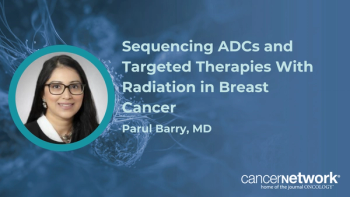
Oncology NEWS International
- Oncology NEWS International Vol 7 No 2
- Volume 7
- Issue 2
Single-Agent Taxanes in Advanced Breast Cancer: A Commentary
Taxanes have been established in the treatment of metastatic breast cancer, and two presentations at the 20th Annual San Antonio Breast Cancer Symposium provide additional data to more clearly delineate the indications and potential use of these agents.
Taxanes have been established in the treatment of metastatic breast cancer, and two presentations at the 20th Annual San Antonio Breast Cancer Symposium provide additional data to more clearly delineate the indications and potential use of these agents.
Dr. John Crown (see page 2) reported the results of the TAX-303 trial comparing docetaxel (Taxotere) at 100 mg/m2 with doxorubicin at 75 mg/m2. The overall response rate for docetaxel was 48%, versus 33% for doxorubicin in 300 randomized patients, demonstrating a statistically significant higher response rate. Responses appeared to be more rapid for the docetaxel-treated patients. There was no difference in time to progression.
The docetaxel response rate was similar to that reported in previous phase II studies: the doxorubicin rate was similar to that in other randomized trials.
Most patients had previous alkylator therapy, but no patients had prior taxane or anthracycline treatment, and half the patients were chemotherapy-resistant. The toxicity profile was more favorable for docetaxel versus doxorubicin.
Another exciting study was presented by Dr. Hans-Joachim Luck (see page 3) evaluating the role of weekly paclitaxel (Taxol) in heavily pretreated metastatic breast cancer patients. He reported that 15 of 41 patients had a partial response; 30% of the patients had received prior taxane-based therapy and 10 had received both an anthracycline and a taxane. Not only did he find a significant response rate, but this regimen was well tolerated without severe neutropenia.
Dr. Lucks findings confirm reports of high activity for weekly paclitaxel in heavily pretreated patients presented at ASCO 1997. These results likely reflect overall time of cellular exposure to a drug with schedule-dependent pharmacokinetics. This offers a tolerable, palliative approach to the management of heavily pretreated advanced breast cancer patients.
These reports of single-agent taxane use show that they are extremely active, and future clinical trials with these agents in combination therapy and in the adjuvant setting are currently ongoing.
Articles in this issue
about 28 years ago
Tobacco Companies Reach Settlement With Texas for $15.3 Billionabout 28 years ago
Archives to Collect Info on Radiation Exposure Worldwideabout 28 years ago
Few BRCA-1 Carriers Take Recommended Precautionsabout 28 years ago
Lifelong Weight Control a Key to Breast Ca Preventionabout 28 years ago
Eight-Year Prostate Brachytherapy Update Shows Good Resultsabout 28 years ago
Patient Brochure on Breast Cancer Tumor Markersabout 28 years ago
Gay Men’s Health Crisis Calls for HIV Reporting in New Yorkabout 28 years ago
ODAC Declines to Vote on DepoCyt FDA Recommendationabout 28 years ago
Photofrin Approved for Early-Stage Lung Cancerabout 28 years ago
Breast Cancer Diagnosed After Childbirth May Be More SevereNewsletter
Stay up to date on recent advances in the multidisciplinary approach to cancer.





































